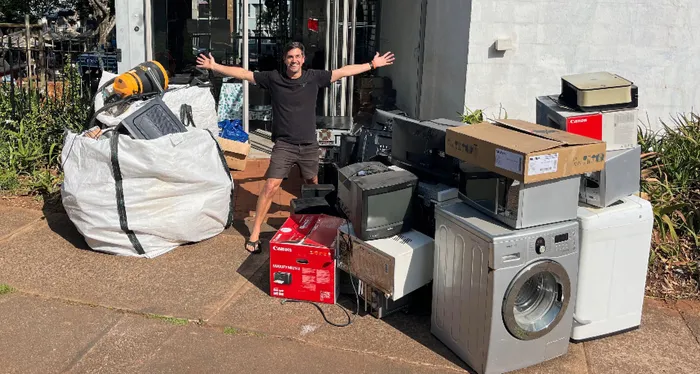Celebrate International e-Waste Day: drop off your old electronics
Recycling event

Paul Jones, a volunteer at groundWork, with some of the e-waste that had been collected.
Image: Supplied
FOR International e-Waste Day, groundWork, a local non-profit organisation, has teamed up with Electronic Cemetery, an e-waste management company, to host an e-waste drop-off event on Saturday in Glenwood.
Established by the Waste from Electrical and Electronic Equipment Forum, International E-Waste Day is held annually on October 14 to raise awareness about the growing global issue of e-waste management and promote responsible e-waste recycling.
E-waste, which is also known as electronic waste, refers to any electronic or electrical device powered by batteries or electricity, such as phones, laptops, TVs, appliances, and lighting.
“Last year’s event collected over 1 000kg of e-waste, and we are hoping to more than double that this year,” said Asiphile Khanyile, the waste campaigner at groundWork.
Khanyile said redirecting e-waste from landfills into refurbishment and recycling initiatives created jobs, mitigated greenhouse gases, and reduced the need for mining primary minerals and producing new electronics.
“All of these processes contribute to building circular economies towards realising a just transition at local level and to climate change mitigation."
Paul Jones, of groundWork, said e-waste was the fastest-growing waste stream globally.
He said disposing of e-waste was important due to the negative impact on the environment.
“Different e-waste contains different types of materials. Some are considered hazardous, for example, certain plastics have flame retardant chemicals that can be bad for human health. If burnt they can release toxins into the environment,” said Jones.
“E-waste also contains valuable metals such as gold, silver, and copper, which can be recovered through proper recycling. However, it also contains harmful substances, including lead and mercury. Improper disposal of e-waste can contaminate soil and water, posing health risks to humans, wildlife and ecosystems, by releasing greenhouse gases that contribute to climate change.
“By ensuring that e-waste ends up into the hands of a certified electronic waste recycler, means that we can recover those components. These components can be used to fix other broken electronics, while the materials such as minerals can be re-mined, essentially recovered and used in making new products.”
He said a laptop being repaired reduced the need to buy another laptop.
Members of the public are encouraged to gather any old, unwanted, or broken electronic and electrical items and take these to the drop-off site on Saturday at the KZNSA Gallery at 188 Bulwer Road, Glenwood, from 9am to 3pm.
Examples of e-waste that will be accepted include toasters, microwaves, fridges, washing machines, power tools, cellphones and tablets, printers, laptops and monitors, radios, cameras, medical devices, inverters and cables. Alkaline batteries, fluorescent lights and printer cartridges will not be accepted.
For more examples visit: https://weeearesa.org/learn/types-of-eee/
Related Topics: